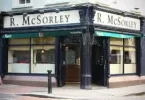Using feedback profitably
A new report from the Hospitality & Leisure team at Barclays Bank in the UK finds that online customer feedback is having a revolutionary effect on the hospitality and leisure sector.
So much so, that its feedback economy report suggests that businesses that don’t adequately respond to the growing online customer feedback trend are in danger of missing a vital opportunity to both grow their business and stay ahead of the competition.
In surveying over 2,000 customers and 541 businesses Barclays assessed how the growth of online customer review sites might affect leisure and hospitality businesses in the future. The results reinforce how important online reviews are for both customers and businesses.
Consumers can now access independent, real-time reviews of outlets such as pubs, hotels and restaurants through user-generated reviews on TripAdvisor. These are being added to at the rate of 200 per minute.
However the Barclays report points out that despite the prevalence of online reviews, this is a comparatively under-researched area.
Customer reviews
Barclay’s survey found that 29% of 25 to 34 year-olds decide where they want to go based on factors such as cost and location but then check to see if there are any bad reviews that would put them off.
And over a quarter (29%) of 18 to 24 year-olds said that online customer reviews are one of the most important factors when choosing where to go compared to 18% of those aged 65 and over.
It also found that the majority of consumers and businesses expect online customer feedback to increase in importance over the next five years.
“A more customer-responsive sector should be more successful at boosting customer numbers” believes the report, “encouraging repeat and longer stays, increasing customer spend, making customers advocates for the business and improving customer service.”
It suggests that across all age groups, leaving feedback is becoming more routine – 45% of customers say they’re more likely to leave online feedback than they were 18 months ago. For 52% of them, one of the most important factors in their decision to leave a review is knowing how important reviews are for other customers, having previously made decisions based on reading reviews.
As for the all-important Millennial generation, while 60% of customers said they trust online reviews this figure rises to 71% among 18 to 34 year-olds. Indeed 29% of 24 to 35 year-olds said they look specifically for good reviews to make decisions, compared to 18% across all respondents.
“These findings suggest that the importance of online reviews is likely to increase over the next decade as these consumers age,” points out the report. It also indicates the opportunities that businesses have to capitalise on this trend. Some 32% of respondents to the Barclays survey visited pubs and bars due to a positive review.
But are businesses making use of this?
Feedback underutilised?
Almost all businesses surveyed said that they’ve processes of some kind in place for monitoring feedback. However only 60% said they monitor review sites specifically.
The pub trade in particular manages and responds to customer feedback through a number of different paths.
85% of publicans surveyed talked to customers while they were on the premises, 78% monitored social media or online fora, 68% asked staff about customer feedback and 63% read online customer reviews.
But only 36% utilised customer feedback surveys or feedback forms organised by their business while 31% read professional reviews.
25% made use of secret shoppers/mystery guest programmes while 8% contracted-out guest satisfaction studies – for example via a telephone poll run by a specialist company. Only 4% had no means of monitoring customer feedback.
“Just under half (49%) aim to respond to customer feedback instantly and have staff or a process in place to constantly monitor feedback,” states the report, “This rises to 57% within three working days. Over half (53%) of businesses said they integrate customer feedback into the business while the same number communicate and share customer feedback with others.”
Hugh Hourican of The Boars Head in Dublin’s Capel Street, for example, gets notifications on his mobile whenever someone posts something about the pub online.
“I’m a big man for twitter, facebook and TripAdvisor,” says Hugh, “It’s great to get feedback.”
The Palace bar, too, has been subject to some great write-ups on Trip Advisor as it’s an original pub with great heritage and a good atmosphere.
“But I really gauge the bar’s success by whether I sell more Porter in the month,” says the ever-pragmatic proprietor Willie Aherne.
Just a stone’s throw from Willie, The Long Hall counts itself in top 5 on TripAdvisor in terms of nightlife and things to do in Dublin.
Some believe that a speedy and transparent approach not only protects the reputation of the business but can often turn a negative review into an opportunity to improve service and retain customers that might otherwise have been lost.
And because feedback comes directly from the customer it’s authentic and can have more impact than marketing or advertising.
This tends to ring true as far as TripAdviser is concerned at Johnnie Foxs in Glencullen.
“It works well for us,” says Fred Rainert, Business Manager there, “We respond to every single comment good or bad although we try to respond offline to these as advised by TripAdvisor.
“If a customer has a genuine complaint we get them back up for a meal and sometimes ask them to come back as a mystery diner if they’re willing.”
Every single bit of criticism the pub gets is logged and saved.
“Of those who contact us by e-mail, we’re not getting even 1% negative feedback,” he says.
Virtual Assistant
Only one fifth of businesses in the Barclays survey have a dedicated member of staff to deal with monitoring and responding to online feedback while 56% replied that their senior management had responsibility for managing feedback received from customers as part of their other responsibilities.
Hugh Hourican (“My kids tell me where I’m going wrong”) looks after social media himself.
“It can be done in the quiet mornings just by sitting in a chair with a cup of coffee because I keep it short,” he explains.
But few businesses keep data to help make their business long-term efficient.
63% of businesses said that they deal with customer feedback in the moment and have no long-term record of feedback for particular customers.
The report suggests that having a robust ‘Customer Relationship Management’ system is important.
It suggests that proprietors should ensure that they have a joined-up strategy for gathering and responding to customer feedback as part of a wider commitment to customer relationships.
“Put effective processes in place to manage and respond to customer feedback, especially where customer feedback has exposed areas of weakness,” it advises.
The survey finds that the sub-sectors where online reviews are most relevant are accommodation (90%), restaurants (69%) and bars/pubs (68%).
Another report, Get Smart To The New Wave from CGA Peach/Zonal, suggests, “Your guest feedback programme is also a crucial element of the guest journey. Offering your customers the opportunity to give their honest opinion, whether positive or negative, is paramount in this day and age where consumers are more than ready to air their views in public.
“A recent study by New Voice Media found that one in three 16-24 year-olds share poor customer experiences online. An operator needs to be mindful that this tech-savvy generation are more likely to take to twitter than tell the server that something is wrong.”
Elsewhere, the report points out that, “A 2016 survey conducted by Social Media Link (21,000 users of social media) states that a ‘positive experience is a motivating factor for sharing for 87% of respondents’ and that facebook is the preferred channel for sharing a positive experience.
So, as the Get Smart report suggests, use social media advocacy in your programme to ensure the good word is spread organically, but that you are the first to hear, privately, about a negative experience, so that action can be taken before complaints become public.
“Thank God I’ve got mostly positive reviews,” says Hugh Hourican, “There’ve been only a couple of negative ones and they’ve been to do with me!” he laughs, “When they come back I’d deal with them, apologise and offer them back to the premises again. Sometimes a couple of negative ones are totally wrong and if you look at their other comments they’ve a problem wherever they go, but I’d still deal with them and often these customers are not interested in coming back again.”
Negative comeback
But not all reviews are what they seem, so operators need to do their homework as Ronan Flood did in Oscar’s which received one particular uncomplimentary review on TripAdvisor.
“We certainly use online feedback to help our business,” he told Drinks Industry Ireland, “We welcome constructive criticism and use this as a tool to improve our offering.
“However, destructive malicious criticism, particularly on Tripadvisor will be treated with the contempt it deserves,” he says, “We, as a management team, are no longer afraid of irrational people who’ll give us a one star review for insane reasons like finding a bone in their fish and chips! We will respond to ridiculous reviews and will robustly defend our business and reputation.”
Most recently, he responded by reviewing the reviewer who’d slated almost every business in the Smithfield Area.

“We, as a management team, are no longer afraid of irrational people who’ll give us a one star review for insane reasons like finding a bone in their fish and chips!” – Oscar’s Ronan Flood.
Return on investment
The hospitality business will find itself more and more indebted to online feedback with the vast majority – 82% – of businesses surveyed by Barclays stating that online feedback has been beneficial for their business, with 67% of businesses seeing an increase in new customers in the past 18 months. Other benefits reported by businesses include improved business reputation (65%), more repeat business (63%), improved customer service (61%) and increased referrals from customers (59%).
“Most businesses also reported having a return on investment. Almost three in five (58%) said they’ve been able to measure the value of online reviews and half (49%) said the value that customer feedback has added to their business is greater than the resources they put in to managing it.
“Of the businesses we surveyed, almost three fifths (57%) said customer feedback has resulted in an increase in customers over the past 18 months while 70% agreed that published customer feedback attracts more customers to their business than it puts off.”
40% of businesses surveyed stated that online feedback had exposed weak points in their business.
“Those businesses that can respond positively to negative feedback can reap the benefits by addressing any weaknesses identified and improving the service they provide. Indeed, when we asked businesses how they have changed as a result of online reviews almost 60% said they had become more responsive to customers.”
In fact just over half agreed that customer service has improved because of the availability of online customer review platforms.
“Given that 56% of consumers also said that bad customer service is the first thing they notice when reading online reviews, businesses that proactively respond to customer feedback not only benefit from improved customer service but also reduce the likelihood of customers having a negative experience and leaving potentially harmful reviews”.










